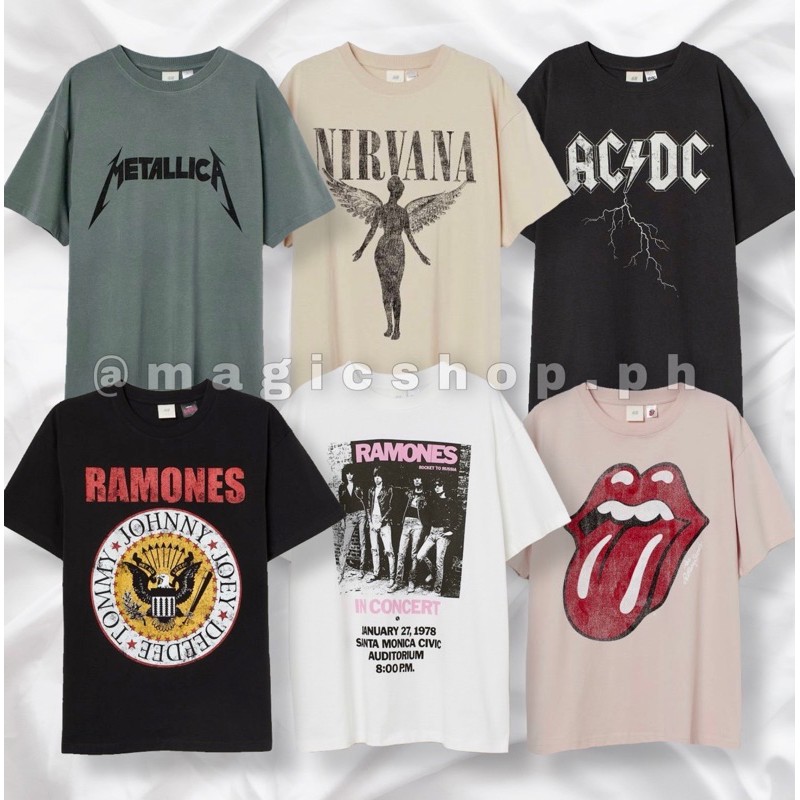Ever wondered where the cash goes when someone picks up a Ramones, Rolling Stones or Nirvana t-shirt in high street stores such as H&M or Primark? The answer to who receives the royalties when a band’s brand almost becomes bigger than its sound mostly boils down to whether or not the artist kept hold of their merchandising rights.
Bands like the Ramones, or more specifically, the estates or surviving members of the band, generally receive royalties from the sale of merchandise featuring their name, likeness, or logos, depending on the legal agreements in place. However, the situation is often more complex than it appears for iconic bands which tend to have diverse approaches to managing their merchandise rights. How they handle these rights varies based on factors like their business acumen, the management they had during their peak, and the longevity of their popularity.
Here’s how other notable bands have managed their merch:
-
The Beatles
The Beatles were pioneers not just in music but also in merchandising. Their legacy is one of the most heavily controlled and protected in the music industry. Apple Corps Ltd., the company founded by the band in 1968, still manages their branding and image. Any official Beatles merchandise, from T-shirts to toys, must be licensed through Apple Corps, which means the band’s estate or surviving members still receive a cut from sales.
In fact, The Beatles are so protective of their image that Apple Corps has been known to pursue legal action against unauthorised use of their name or likeness. Consequently, any Beatles-themed merchandise in shops like Primark or H&M is almost certainly licensed, and the band’s estate profits from it.
-
Nirvana
Nirvana’s branding, including their iconic smiley face logo, is another example of heavily managed merchandising. After Kurt Cobain’s death, Courtney Love (his widow) initially controlled much of the rights to Nirvana’s name and likeness. Over time, those rights have been shared with surviving members, like Dave Grohl and Krist Novoselic, and Cobain’s estate.
Nirvana merchandise continues to sell well in mainstream fashion retailers. This success has led to disputes over trademark ownership. In 2020, Love sued Marc Jacobs for allegedly using the smiley face logo without proper licensing. This highlights the legal complexity behind who profits from band merchandise, particularly when the members have passed away or the band has disbanded.
-
Led Zeppelin
Led Zeppelin has taken a very careful and selective approach to licensing their brand. The band controls their merchandise through their company, Warner Music Group’s Warner Music Artist Services. Their merchandising strategy has been somewhat minimalist, focusing on premium products and collaborations with high-end designers. While you might not find their merchandise as easily in stores like H&M, the band and their representatives likely receive significant royalties from the more exclusive deals they make.
The band members, particularly Jimmy Page and Robert Plant, have been notoriously strict about licensing. This ensures that any merchandise sold is not only officially licensed but also provides a solid revenue stream for them.
-
KISS
If there’s one band synonymous with the concept of merchandising, it’s KISS. From action figures to coffins (yes, really), KISS has mastered the art of turning their image into an empire. Gene Simmons, the band’s co-founder, is known for his entrepreneurial spirit and has made merchandising a core part of KISS’s business model.
KISS doesn’t just license merchandise—they actively seek out new opportunities for branded products. As a result, the band reportedly earns more from merchandise sales than from music itself. In retail settings like Primark or H&M, you’re likely to find a wealth of KISS-branded items, all officially licensed with royalties funnelling back to the band.
-
The Rolling Stones
The Rolling Stones’ iconic “tongue and lips” logo is one of the most recognisable in music history, and the band has capitalised on it extensively. Managed by Bravado, Universal Music Group’s merchandising division, their branding is seen across a wide range of products, from high-end fashion collaborations to budget-friendly apparel in mainstream retailers.
The Stones have maintained strict control over their image and branding, ensuring that they see revenue from all officially licensed products. The band’s management is highly protective of their intellectual property, and Mick Jagger and Keith Richards have long been known for their business savvy, ensuring a steady stream of income from merchandise sales.
-
Metallica
Metallica is another band that has managed to maintain strong control over their merch. Through their company, Metallica’s Blackened Recordings, they’ve taken steps to ensure their branding is protected and well-managed. Like The Beatles and Nirvana, Metallica actively seeks out partnerships with major retailers and ensures that their brand is represented officially.
Interestingly, Metallica has also embraced more affordable merchandise lines, allowing their fans to access products at various price points. This strategy helps keep their name visible and ensures that they receive royalties from a broad range of retail outlets.
Summary of Merchandise Management Approaches:
- Strict Control: Bands like The Beatles and Led Zeppelin manage their merchandising carefully, often working through established companies like Apple Corps or Warner Music Group to ensure quality control and royalty protection.
- Aggressive Licensing: KISS, in particular, is a master of aggressive merchandising, turning every aspect of their brand into a product. Their approach is more entrepreneurial, focusing on volume and visibility.
- Legacy Protection: Bands like Nirvana and Ramones face complex legal scenarios when it comes to their merch. Often, the rights are split among estates and surviving members, leading to occasional disputes or inconsistent financial returns.
Each band’s situation is unique, but in general, the more control they’ve maintained over their brand and image, the more they can benefit from merch sales in major retailers.
If you’re an independent artist looking to increase your revenue streams through merch, read our guide on how to boost sales.
Article by Amelia Vandergast


